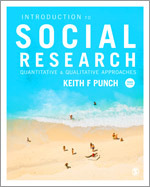Introduction to Social Research
Quantitative and Qualitative Approaches
- Keith F Punch - University of Western Australia, Australia
The third edition includes:
- A new chapter on literature searching and reviewing
- Expanded coverage of ethics
- A new section on using the internet in research
- A range of additional student learning features
- A brand new companion website including full-text journal articles, additional case studies and video tutorials.
Supplements
Companion website to accompany the Third Edition of Introduction to Social Research
Delighted to receive this new version of a trusted favourite. A very accessible and well-laid out text that covers each aspect in detail without overwhelming the reader. Strongly recommended for BA (Hons) students who are engaging in research for the first time.
For my learners other texts preferred
This is an extremely clear guide, which is wide-ranging yet simple in its approach. As would be expected of an 'introductory' text, there are many areas where you might want a deeper analysis, but the use of extensive Further Reading sections and referencs within the texts are extremely useful to guide further reading.
A very user-friendly text.
Excellent book for my level 5 students conducting their research project. Well written, informative and at the right level. I have recommended this book to my students.
The chapter layouts in this book are excellent, taking the student through from the clearly identified learning outcomes to the final chapter summary in a structured and easy to follow manner. I particularly like the lists of key terms (a point of difficult to grasp among new researchers) and the self-help exercises to test understanding of the concepts and practices. This text will help students, of any discipline, to justify their research method(s) and to deliver on the research design.
The book is a hands-on guide for students considering the most appropriate approach for their intended research. It provides a detailed overview of both qualitative and quantitative methodologies. The clearly stated learning objectives are supported by self assessment exercises that aids the learning and application of methodological insight.
Every student interested in empirical research in their papers and theses will be given this book by me! What a treasure - it really provides answers and helpful suggestions to so many different and detailed questions, that so often get neglected or forgotten.
This is a very well written and accessible research book that I would recommend to any students studying research methods, or actively engaged in research.
Clearly structured for the student who is new to research. Tackles the difficult aspect of deciding upon a research question. Exercises and questions at the end of the chapter help the reader to reflect on their understanding and signposts to Notes and further reading to support understanding. Good chapter on the literature review starting with the basics before guidance on writing it up with some helpful question prompts. Written accessibly and would be a useful book for the social researcher.
This book offers a comprehensive overview of social research. Chapters on developing research questions are a particularly welcome inclusion. Chapter features such as learning objectives, bulleted lists and end of chapter lists improve accessibility, although some concepts (e.g. quantitative design) would be enhanced by more graphics. The chapter on the internet is an important addition and highlights the need for consideration of an even broader range of technological innovations which support social research.



